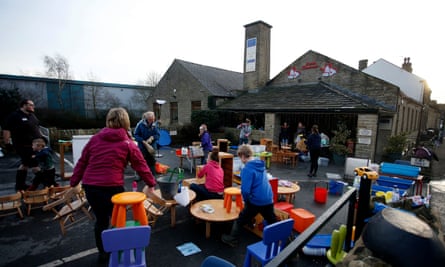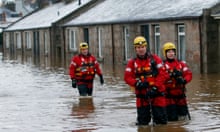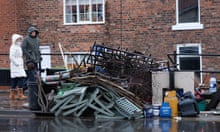Flooding chaos returned to Scotland on Friday, forcing people to flee their homes and causing major disruption to transport networks.
Villages in Aberdeenshire were left assessing the damage after the river Don rose to record levels and overtopped its banks. Homes were evacuated in Inverurie, Port Elphinstone and Ellon overnight as the swollen river sent flood waters racing down the streets.
The heavy rain closed roads, and trains and flights were cancelled in Aberdeen and the surrounding region as water levels reached record highs.
Residents in Aberdeen’s Grandholm area were urged to leave their homes amid fears the river Don would overtop its banks. Upriver, the towns of Inverurie and Kintore in Aberdeenshire have been badly hit by flooding, prompting the local council to call for volunteers to help with emergency relief efforts.
People were put up in rest centres while a number of local hotels also opened their doors to flooding victims free of charge.
Police Scotland declared the flooding a major incident.
Ch Supt Campbell Thomson said: “Over the past 24 to 48 hours, and indeed the past week, we have responded to a number of flooding incidents and coordinated the multi-agency response to the adverse weather.
“A major incident was declared due to the severity of the warnings in place and the potential for serious impact on communities.
“Our focus over the past 36 hours has been the Donside area, Keith to Huntly, Turriff, Inverurie, Kintore, Ellon and into Aberdeen, including Riverside Drive and the Grandholm area.
“Additionally, we continue to support the recovery effort in Deeside, specifically in the Ballater and Braemar area, following the impact of Storm Frank.”
Meanwhile in the north of England, people were taking stock of the damage caused by recent flooding.
In Calderdale in West Yorkshire, which bore the brunt of Storm Frank on Boxing Day, local officials said more than 100 key bridges were being monitored over fears they could collapse with further heavy downpours.
There are some 300 bridges in the area, without which much of the area would be completely cut off. Of those, 118 need regular inspection.
“It’s going to take a huge amount of work and new investment to get things back to normal,” said Barry Collins, the Labour deputy leader of Calderdale council. “We are monitoring the key ones – that’s about 118 bridges regularly at the moment in the aftermath of the floods. The flood was just a total calamity in Calderdale from one end to the other.”

There were 10 flood warnings, meaning immediate action was advised, in the north-east and north-west on Friday morning, plus 53 less serious flood alerts from already swollen rivers and saturated ground.
Many of the warnings have been in place since Boxing Day and include the river Ouse in York, which caused scores of homes to be evacuated when it overtopped its banks after Christmas, and the river Derwent in parts of North Yorkshire.
Flights were unable to land at Aberdeen airport on Thursday night after “unprecedented” rainfall damaged a section of tarmac on the runway.
The airport said it hoped to resume normal service on Friday but advised passengers to check with their airline before travelling.
A Met Office amber warning for heavy rain has now expired but has been replaced with a yellow warning for snow and ice for much of Scotland, Northern Ireland, north-west and north-east England.

Scotland’s deputy first minister, John Swinney, said: “The impact of this latest round of flooding is causing transport difficulties and putting properties at risk of flooding. The Scottish government’s resilience committee is monitoring the situation very closely and we have discussed the unfolding events and work to mitigate the impacts and ensure the safety of people in local communities.”
Aberdeenshire has experienced persistent rainfall since Storm Frank hit on 30 December and rivers were already swollen and ground saturated before the latest deluge.
Rest centres have been set up across the region for people who have been forced to leave their homes and more than 20 schools have been closed or partially closed due to the severe conditions.
The emergency services were called in to help pupils in Brechin return home from classes on Thursday.
Residents with private water supplies that may have been contaminated by flood water have been advised to use bottled water as a precaution.




